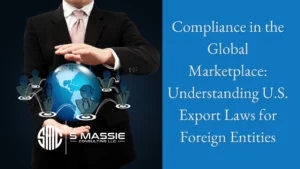What Landed Your Client on a Restricted Parties List?
Ever wonder what could land a company, maybe even one of your clients, on one of the restricted parties lists? In this article, we will explore the concept of restricted parties lists, understand their implications, and discuss the importance of export compliance to avoid costly enforcement actions.

Understanding Restricted Parties Lists
Restricted parties lists are determined by the US Government and serve as databases listing parties (individuals or entities) with which conducting business is either prohibited, requires a license, or necessitates additional due diligence. These lists are designed to ensure compliance with export regulations and safeguard national security, foreign policy, and economic interests.
The Importance of Export Compliance
Export compliance regulations play a crucial role in avoiding costly enforcement actions from the US Government. Complying with these regulations helps prevent violations and protects both a company’s finances and reputation. Understanding the “who” part of export compliance regulations, as represented by restricted parties lists, is vital to ensure responsible business practices.
Checking Against Restricted Parties Lists
Every export should be cross-checked against restricted parties lists as they can be updated at any time. The International Trade Administration (ITA) provides a Consolidated Screening List that encompasses 11 lists maintained by various US Government agencies. These include the Denied Persons List, the Entity List, Unverified Parties List, the Specially Designated Nationals List, and the State Department’s list of debarred parties.
The Role of the Bureau of Industry and Security
The Bureau of Industry and Security‘s (BIS) Export Enforcement Office is responsible for protecting US national security, foreign policy, and economic interests by investigating violations, interdicting illegal exports, and pursuing violators of export control laws. Violations and investigations can lead to significant penalties and damage a company’s reputation. Establishing an Export Compliance Program, complete with a written manual, is instrumental in avoiding such pitfalls.
Recent Developments and Implications
In a recent announcement, the Bureau of Industry and Security added 77 new entities to the Entity List, citing actions contrary to the national security or foreign policy interests of the United States. Among the additions was Chinese drone company DJI, which dominates the global market for camera drones. The decision to include DJI on the list was based on concerns about its products being used in human rights abuses.
Seeking Professional Assistance
Navigating the complexities of restricted parties lists and ensuring compliance with export regulations can be challenging. S Massie Consulting LLC, led by President Sarah Massie, offers expertise in assisting companies with navigating restricted parties lists, developing comprehensive Export Compliance Programs, and addressing various compliance regulations. Their guidance can help your company avoid costly export violations and maintain a strong reputation.
Conclusion
Understanding the reasons behind landing on a restricted parties list is crucial for businesses and individuals involved in international trade. By prioritizing export compliance, conducting thorough screenings against restricted parties lists, and seeking professional assistance when needed, companies can mitigate the risks associated with non-compliance. Maintaining a strong commitment to responsible business practices will not only protect the company’s interests but also contribute to the overall integrity of international trade.
Export compliance is a critical aspect of international trade that demands your attention. By understanding and adhering to export regulations, implementing robust compliance programs, and leveraging technology solutions, you can navigate the complex export landscape while maximizing profits.
Furthermore, conducting thorough market research, building strong relationships, optimizing pricing strategies, and capitalizing on free trade agreements will enhance your profitability in export operations. Striking a balance between compliance and profitability will ensure your business thrives in the global marketplace, paving the way for sustainable growth.
S Massie Consulting LLC specializes in helping businesses comply with export regulations. The company provides tailored written export compliance programs that include policies and procedures to ensure that exports are compliant with applicable laws and regulations. Additionally, the company offers employee training programs designed to educate employees on the regulations and laws governing exports, making sure they understand their responsibilities and the consequences of non-compliance.
FAQs
Restricted parties lists are databases maintained by the US Government that identify individuals or entities with whom conducting business is either prohibited or requires additional due diligence to ensure compliance with export regulations.
Compliance with export regulations is essential to avoid costly enforcement actions from the US Government. Violations can result in significant penalties and damage a company’s reputation.
The International Trade Administration (ITA) provides a Consolidated Screening List that encompasses various restricted parties lists. This list can be used to cross-check parties and ensure compliance with export regulations.
The BIS’s Export Enforcement Office is responsible for investigating violations, interdicting illegal exports, and pursuing violators of export control laws to protect US national security, foreign policy, and economic interests.
Seeking professional assistance, such as that provided by S Massie Consulting LLC, can help navigate the complexities of restricted parties lists, develop comprehensive Export Compliance Programs, and ensure compliance with various regulations, thereby minimizing the risk of costly export violations.


